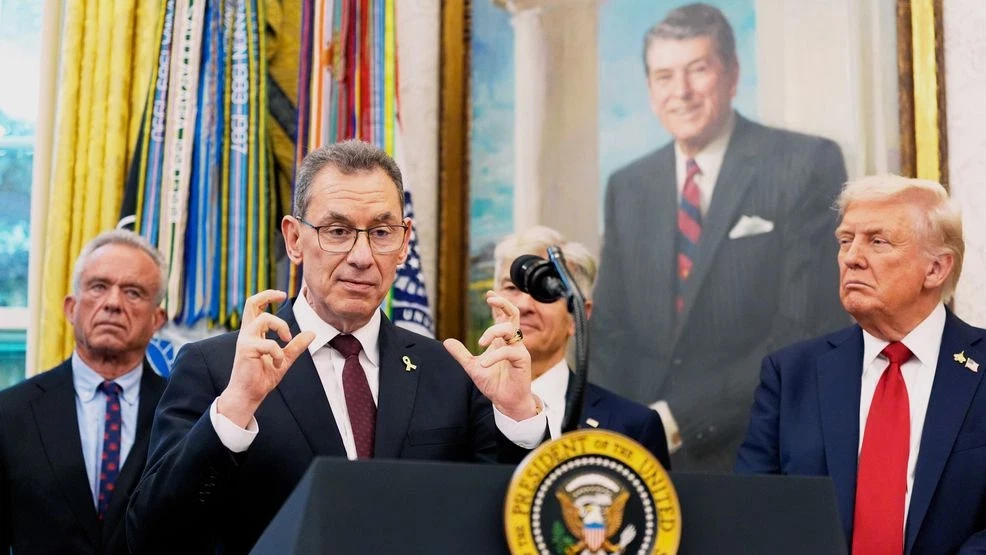
President Donald Trump aimed at lowering prescription drug costs for Americans with the creation of a direct-to-consumer website to buy medications and a new deal with Pfizer to reduce the cost of some of its drugs.
The plans are the latest in a the administration has made trying to reduce the cost of prescription drugs and make prices more comparable to what other wealthy nations pay. Trump has also signed executive orders targeting drug prices and that do not agree to shift plans to align with the administration’s policies.
He has also threatened tariffs on pharmaceuticals for any companies that are not building manufacturing facilities in the United States, defined as “breaking ground” or being “under construction.” Pfizer received a three-year exemption because it is building and expanding factories in the U.S.
Tuesday’s announcement with Pfizer CEO Albert Bourla included selling drugs to Medicaid and setting prices of new medications at “most favored nation” levels, or the lowest price available in other peer countries. Pfizer will also sell some of its drugs at a 50% discount on average, on a new direct-to-consumer website called TrumpRx where Americans can buy medicine directly from manufacturers without insurance.
TrumpRx will reportedly launch early next year and will not sell or distribute drugs, instead directing consumers to manufacturers’ own direct-to-consumer portals.
Trump said the deal with Pfizer was a game-changer for Americans, where prices for brand-name drugs are nearly triple the cost as those other wealthy nations.
“We’re ending the era of global price gouging at the expense of American families,” he said.
What is unclear is whether they will result in lower prices for Americans at the pharmacy counter. Drug pricing experts said Pfizer and other drugmakers already give Medicaid significant discounts, so further discounts even when compared to peer nations may be limited. Medicaid recipients also typically only pay nominal fees for prescriptions and any savings on drug prices are more likely to benefit states that administer the program.
“This deal is not going to change what people pay out of pocket at all, because what they pay out of pocket is not actually mechanically related to the price that is charged to them,” said Rena Conti, an associate professor at Boston University’s Questrom School of Business.
The direct-to-consumer pipeline may also not ultimately end up saving money for most Americans that have health insurance through their employer or the government. For most people and drugs, they are more likely to save money using insurance or drugmaker coupons than taking on the entire cost buying direct through drugmakers, even with a substantial markdown.
Tuesday’s announcement also did not include cuts to prices offered to employers, private insurers or Medicare.
The Pfizer agreement was the first with a drug company after the president earlier this year with a list of demands to reduce drug prices or face the wrath of the U.S. government. Trump said during the event with Bourla that his administration is working with other companies soon to secure “similar agreements.”
Other companies may move to make similar agreements to Pfizer’s, with many major manufacturers already announcing plans for expanded manufacturing within the U.S., to avoid the threat of the president’s tariffs.
“It’s gonna be really interesting to see who else wants to publicly commit to most favored nation, to the whole suite of demands that the Trump administration has asked the companies to do,” Conti said. “The details here are so limited that it’s really hard to tell what the cumulative effect of these not very detailed plans are on to predict how actual spending or what people’s experience at the pharmacy counter is going to be.”
Bourla said during the event at the White House that tariff threats helped motivate the deal, and drugmakers could be further incentivized through a new voucher program that will quicken approvals for new drugs, which would help bring them to market sooner.
Industry groups have pushed back on Trump’s proposals for “most favored nation” pricing, arguing it will stifle innovation and demands to lower prices charged in the U.S. In a statement after the Pfizer agreement, its main trade group PhRMA said companies will have to make their own decisions.
“Each company makes its own decision on how they set prices for medicines,” PhRMA CEO Steve Ubl said, adding it “does not do enough to address the real drivers of higher prices in the U.S.” like pharmacy benefit managers and hospital markups for drugs.
More companies have already recently announced direct-to-consumer channels to buy medications without going through insurance. Industry experts have also said drugmakers could raise prices in other countries rather than lower them in the United States to bring themselves into compliance with the rule.



